- Home
- S. C. Stephens
Under the Northern Lights Page 3
Under the Northern Lights Read online
Page 3
Tears of relief and joy coursed down my cheeks as I pulled my bag free from the snow. The durable material was still in one piece. Inside the bag was an easy-to-set-up one-man tent, a below-zero blanket, emergency food, and a pot to boil water. There was also a first aid kit and pain relievers. I knew whatever I had with me wouldn’t be strong enough to take away all of the pain I had, but it would be better than nothing. The bag was hope, and I clung to it with everything left inside me.
There were loose small branches and twigs under the safety of the trees. I gathered them together into a pile, then got to work igniting them. With my shaking fingers, it took longer than I wanted, and my joy shifted to frustration. I couldn’t give up, though—not with physical relief in my grasp—and eventually the dry wood caught, and a small fire started growing into a larger one. The immediate heat was an instant mood elevator, and I was smiling so hard that my cheeks hurt. There was nothing like warmth when you were chilled to the bone. And as an added bonus, the flames would help keep away any predators who might have discovered me. The fire didn’t ensure my survival, but it was a much-needed step along the way, and I finally began to believe I could do this.
I suddenly wanted to sit in front of the fire, but I needed to finish first—when I was finally able to rest, I wouldn’t want to get up again. Setting down my crutch, I carefully pulled the tent out of the bag and popped it open. Then I grabbed the insulating blanket and wrapped it around myself. After pulling out my meal for the night—beef jerky and dehydrated fruit—I finally and thankfully sat down on a log near the fire. It was so heavenly a sob of joy escaped me. Thank God . . . I made it.
Adding sticks to the blaze, I reveled in the heat as it soothed my aching body. Breathing wasn’t any easier, and my leg radiated with pain, but I felt more at peace. I’d made it through my checklist, accomplished everything I’d needed to do to survive. For today. Tomorrow, the list would start again. And again. And again. Until finally, I somehow managed to get out of here. But that was far down the line and not worth stressing about at the moment. For now, I was simply overjoyed to be alive, and I was going to revel in that feeling.
Setting my pot on the edge of the fire, I filled it with snow. I’d give anything for some wine right about now or some whiskey, but water would have to do. When it was ready, I set the pot in the snow to cool the water down. Then I drank my fill. It wouldn’t seem like you could get dehydrated in severe cold, but you could, just the same as in the desert. Once I was satiated, I melted more snow and washed my face as best as I could. Sharp stings—especially above my eye—reminded me just how scraped up I was. After my face was clean, I loosened the straps around my leg. Grabbing a flashlight from my bag, I tried to get a good look at my injury. It was hard to see around my pants, so I found some scissors and made a larger hole. The wound looked nasty, but it didn’t appear to be bleeding heavily anymore—just oozing. I was grateful for that. Digging through my small first aid kit, I grabbed antibacterial ointment and some gauze pads. I cleaned up the wound as best I could, then rewrapped my thigh. Even though I left the straps looser than before, pain still washed through me in waves when I cinched it. But still, in as much agony as I was in, I knew I was blessed; I shouldn’t have survived that crash.
As I sat there enjoying the heat of the fire, the sun sank past the horizon, and darkness settled around me. The temperature would truly start to plummet now. Just as I had that thought, an icy wind whipped through my little camp, slightly lifting an edge of my tent. The sky had cleared somewhat since the crash, but if another storm was on the way, waiting it out inside my shelter was the safest place to be. I poured the remaining water on the fire, then grabbed my bag and crawled inside my tiny tent. It was tight with both me and the bag inside, but I didn’t have a bear-proof container handy—all the ones I’d brought with me had been destroyed. And besides, I wasn’t about to let the bag out of my sight after everything I’d gone through to find it.
The wind picked up, howling just as ominously as the wolf I’d heard earlier. The sides of my tent rattled in the gusts, shaking so hard it was like someone was outside, playing a practical joke on me. But this was no joke. I was safe, though, and relatively warm. I could move all my fingers and all my toes, although I tried not to move the ones on my injured leg. All things considered, I was very lucky. Counting my blessings, however small they might be, I closed my eyes and let the day’s exhaustion overtake me.
That was when I heard something alarming in the breeze. A huffing, grunting sound. A sniffing nose, searching the ground for food. A large nose, belonging to a large beast. A grizzly. A deep snort somewhere off to my left confirmed my suspicions. There was a bear somewhere in the woods, somewhere close by, probably going through all the food that had exploded from my belongings during the crash. I put my hand on the rifle that I’d also brought into the tent with me, and then I reclosed my eyes. Even though I was shaking with fear, I knew there was nothing I could do about a curious, hungry bear, except pray that it would be satisfied with the food I’d left scattered and would leave me alone.
Please don’t let me live through a plane crash only to be mauled by a bear . . .
Chapter Three
I awoke early the next morning when the sun was barely gracing the sky. How I’d managed to sleep at all was beyond me. Pure exhaustion, probably. The bear had sniffed and snorted its way around my campsite, but for reasons unknown, it had left me alone.
My body hurt ten times more than it had yesterday. I knew that was both a blessing and a curse. Aching muscles and cracked ribs would heal, given enough time, but the pain had to get worse before it could get better. The only thing that truly concerned me was my leg. My pants were stained and splotched with blood, and I was sure I should probably have stitches to close the gaping wound. I didn’t have those kinds of supplies with me, though . . . and I wasn’t sure I could sew my own skin even if I did. Just the thought made bile rise up my throat. I’d just have to trust that the wound would close completely on its own and hopefully wouldn’t get infected in the process. Aside from the antibacterial ointment, I didn’t have anything on me that would help with an infection.
While that was a fear that filled my stomach with icy dread, I had to ignore it. There was nothing I could do about it, and there were too many other things that needed to be done. I needed to gather wood for fires and find a way to keep it dry—staying warm was essential. I’d need to add to my food stores if I was going to make it here long term, and considering I couldn’t blindly walk home, I’d say I was going to be here for a while. The search for food might have to wait until my leg healed somewhat, but considering that the grizzly had probably devoured every piece of nutrition that wasn’t in my bag, I knew I’d have to go out while injured. And like everything else, that would make hunting a thousand times harder. I hated what I was going to have to endure soon—what I was enduring now—but it was what I had to do to survive. Giving up wasn’t an option.
But first, wood and maybe a more substantial shelter . . . something a little more bear proof. Unwrapping myself from my blanket, I began the process of sitting up. And it was a process—everything was. Breathing was still hard to do, and I wished I had something to wrap tightly around my chest. Any form of support would be a comfort. Letting out short, unsatisfying huffs, I unzipped my bag to find breakfast—dried meat and protein bars. I figured I had about a couple days’ worth of “real” food in there, and then I’d be on to the emergency freeze-dried food.
I’d planned ahead when I’d prepared my plane, but the crash and the bear had changed all that. I’d have to supplement my stash with wild meat—fish, deer, rabbits. Life here was abundant, if you knew where to look. Of course, this wasn’t my normal stopping area, and I had no idea what the geography was like, where the lakes and rivers were. Fear and doubt started crowding the edges of my brain, fighting for dominance, but letting those emotions take over would only hurt me, and I was hurting enough.
Shoving them aside, I fo
cused on what I knew. I was good at tracking, and I understood animal instinct. I was positive I could set some traps and find some food. After foraging for wood and fortifying my shelter, of course. God, I had so much to do, and I was so weak, so tired . . . in so much pain. But I had people waiting for me . . . I had to keep going. Just keep going.
Gnawing on my breakfast, I tried redirecting my darkening thoughts by thinking about what I would have been doing right now if I’d made it through the storm and my plane had landed normally. I’d be eating the same food and staying in the same shelter, but I’d have full use of my body, and I’d be excited about the day’s possibilities. I’d be looking for tracks, preparing my camera. Oh God, my camera. It could be anywhere in the woods—finding it would take a miracle. Not that it really mattered if I did happen to stumble across it . . . my camera was most likely broken, if not completely shattered. A surge of grief struck me like a physical blow, and tears swelled in my eyes and rolled down my cheeks. On the list of things that I’d lost, my camera seemed trivial, but a part of my soul was wrapped in that glass and plastic, and it killed me to know it was gone. Wiping my cheeks dry, I reminded myself that objects could be replaced. My life couldn’t be.
If I hadn’t crashed, I’d be snapping my favorite animals, capturing photos that would sustain me for months, if not longer. Foxes, hares, moose, bears, wolves: I’d be eager to see them. But now . . . a lot of those creatures I hoped to never see while I was here. Everything was different now that my life was on the line, and that made me want to weep. The very animals I’d come here to see might be what destroyed me.
If I hadn’t lost my plane, I’d be returning to Idaho in a few weeks. That was the hardest what-if to think about, and my eyes stung with tears again as home floated through my mind. My dogs would cover me with sloppy kisses. Mom would hug me like she’d been sure she’d never see me again. Then she would tell me I shouldn’t go out into the wilderness alone, and I should stay and work at the diner with her full time. But right after that she would give me a small, relenting smile and ask to see my pictures. Dad would agree with Mom’s every word about me staying home; then he’d contradict himself by excitedly telling me every fact he knew about all the animals I’d photographed. Dad’s passion had fueled my own—I’d learned more about the natural world from listening to him than from National Geographic. Patricia would listen intently to all my stories, then start psychoanalyzing why I’d chosen such a dangerous, antisocial career. Shawn would hover, not-so-subtly watching over me, making sure I was truly okay. Then he would tell me we’d made a huge mistake and beg me to take him back. But I wouldn’t, because I knew we were only ever meant to be friends.
That was what should have been in my future, but now . . . the odds of me getting back to that life were so slim I might as well have been planning a trip to the moon. I was never leaving these woods. I would never see my loved ones again, and they would never really know what had become of me. They’d miss me; they’d mourn me . . . for ages. And in their hearts, they would believe that they’d been right—that I should have shelved my dream and lived a life of safety and certainty. That wasn’t what I wanted . . . but neither was this.
Despair started settling over me like a wet blanket, dragging me down deeper and faster than I could resist. Despondency cut off the light, the oxygen—the love—until all I felt was cold, alone, and in pain. I was going to die here. The wolves would feast until my bones were the only remaining trace of me.
As if to punctuate my point, a lone wolf howled in the distance. Anger shot up my spine, obliterating the chill and easing the depression. No, I wasn’t ready to stop fighting. I’d never stop fighting, not until the last breath escaped my lips. So long as I was alive, there was still hope.
After my energizing meal, I felt a little better, less prone to mood swings. It never ceased to amaze me how having something in my stomach, even if it was only dried fruits and a handful of nuts, could lift my spirit. Securing my pack, I strapped the gun across my back and opened my tent. The cold struck me as hard as a fist, reminding me just how well my deceptively simple shelter retained heat. Struggling to get to a standing position, I twisted around and sealed the tent. After a quick bathroom break, I made a fire with the last of my dry wood. That was a problem I’d have to fix right away. Fire was my lifeline, my preservation against the chill ceaselessly trying to encapsulate me.
Sitting on a fallen log beside the fire, I propped my aching leg on a nearby rock. While I warmed up, I examined my thigh again. The gauze pad was bloody, so I carefully replaced it with one in my pocket. The wound was still wet, still seeping blood. That was bad. It shouldn’t still be bleeding. Anxiety began to crawl up my spine as I wondered how I could seal the skin, promote faster healing. I had nothing for stitches . . . so cauterize the wound? God . . . could I do that? Stick a flaming-hot piece of wood into my body? Willingly? No . . . it could wait. I’d figure that out tomorrow, if I had to. Maybe it would be fine soon.
When the fire died away, I grabbed my makeshift crutch and prepared myself to gather more wood. Warmth was the greatest thing I could do for myself right now—and it was far less stressful to think about. Walking was a struggle, though, and I was breathing heavily after just a couple of paces. My lungs felt on fire from the exertion, but I didn’t give up. I couldn’t. I needed heat. Trudging past the plane wreckage reminded me of the crash, and painful memories flashed through my brain. Averting my eyes from the warped metal, I saw the evidence of last night’s predator. Wrappers, Tupperware, and tinfoil packets that used to hold food were everywhere, and it was clear every morsel had indeed been picked clean by the bear. All I had left was stuffed in my emergency bag. Damn it . . . I’d secretly been hoping something would be left, and it was crushing to learn that wasn’t the case.
Since I was firmly holding on to the crutch with one hand, I had only one arm to carry back wood. It was inefficient and frustrating, but it was all I could do. Close to camp, I found a pine tree that had thick branches. The bottom branches were so low that they were partially buried in the snow covering the ground. Wearing my warmest gloves, I removed a section of snow and pulled the branches up. Near the base of the tree was a clear, dry spot that was now my woodshed. Good. I didn’t think I had the strength to build one.
It took all morning and a good chunk of the afternoon to fill the space beneath the tree with wood. When I was done for the day, I was disappointed. It had taken far too long, and I hadn’t gathered nearly as much as I’d wanted to gather. But days were short here, and I only had an hour or two of light left . . . and I was utterly exhausted. Every time I moved, bolts of agony radiated through my leg and chest. Everything hurt so much that I was almost getting immune to the pain. Almost. I wanted to rest—more than anything—but I needed to strengthen my shelter first. That was too important to set aside, even for a day.
Taking a second to rest, I mentally prepared myself for the task. I’d need to cut some thick branches, then tie them together in an A-frame. Then I’d need to cut some boughs off the pine tree, making pseudo-shingles for the sides. Simple, yet at the moment, exceedingly difficult. More than my brain or body could handle. I had no choice but to press on, though. Even still, I stared at my shelter for a solid ten minutes before I gathered enough willpower to get started.
Since everything took so long for me to do, I cut only half of the large branches I needed before darkness fell over me. Cursing my weary body, I called it quits and grabbed some logs so I could make another fire. I was trying to get the still-damp wood to light when I noticed something that froze my heart. A pair of eyes reflecting light from the moon. I’d only seen it for an instant, but it had been long enough to know what it was—trouble. Ice flooded my veins. My heart started beating harder, and my breaths grew faster, making my bruised chest ache.
“Get out of here!” I yelled, again trying my damnedest to light the fire. Some predators were scared off by loud noises they didn’t understand. Some. Not all. Staying near
a blazing fire was my best bet, but I needed flames first.
A low growl in the night raised the hairs on the back of my neck. It sounded like a dog, which instantly made my blood go cold. Oh my God . . . no . . . wolves. Wolves were among the most intelligent hunters in these woods. They had speed, strength, and the numbers to make them a near-impossible foe, and as I recalled the flash of eyes I’d seen in the darkness, something my father had told me once popped into my mind: It’s not the wolf you see that you should worry about. It’s the other ten you don’t see that are the problem.
Fear made my fingers shake, made flicking the lighter even more difficult. The wolves were probably surrounding me right now. They could smell my blood, sense my nervousness. To them, I must seem like easy, injured prey, certainly a lot easier to take down than a five-hundred-pound moose—and they didn’t have much trouble with those. I wasn’t exactly defenseless, though. I had a weapon, and in a minute, I’d have a fire. Sudden indecision made me pause. Shit. Do I continue struggling with the fire, or do I unsling my rifle and blast a couple of warning shots at them?
That was when I saw three of them slinking their way out of the tree line. Their teeth were bared, hackles raised, and a menacing growl was escaping their lips. They were clearly telling me, Don’t do anything stupid. I wasn’t about to meekly let them eat me, though.
Heart in my throat, adrenaline rushing through me like a river, I fumbled for my gun. Like I’d signaled a race to start, the three wolves surged forward. Oh God . . . I heard sounds behind me and knew more of them were closing in that way. I could almost hear a countdown to my death beginning. Five. Four. Three . . .
Yanking the rifle off my body, I swung it around, chambered a bullet, and fired. Something yipped in pain, but I couldn’t tell which dark creature I’d hit. I hadn’t been prepared for the recoil, and I lost my balance. Putting too much weight on my bad leg, I felt my knee buckle, and I started falling backward. I immediately tried to correct myself, but the log I’d been using as a chair was in my path, and I landed hard on the rough bark. My ankle caught underneath the wood, and I felt something wrench before it pulled free. Pain made me cry out, but I was still falling. I slid off the log, and my back hit the snowy ground. I could hear the huffing, puffing sound of animals running my way, could feel a ripping pain in my thigh as the wound protested the violent jerking. Gun still clutched in my fingers, I chambered another bullet, raised it over my head, and fired blindly.

 Effortless
Effortless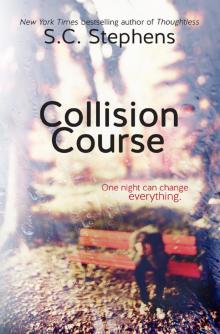 Collision Course
Collision Course Thoughtful
Thoughtful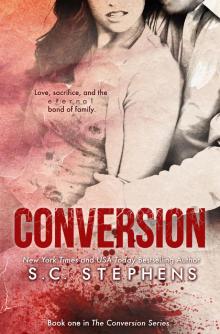 Conversion
Conversion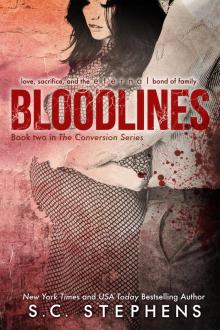 Bloodlines
Bloodlines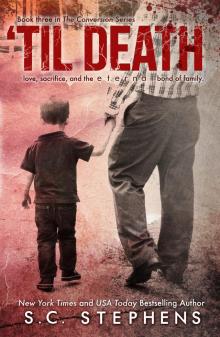 Til Death
Til Death Reckless
Reckless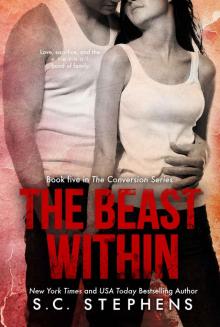 The Beast Within
The Beast Within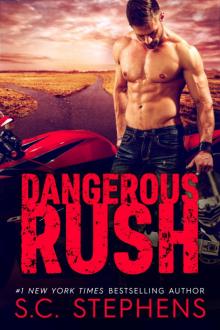 Dangerous Rush
Dangerous Rush Thoughtless
Thoughtless Untamed
Untamed Furious Rush
Furious Rush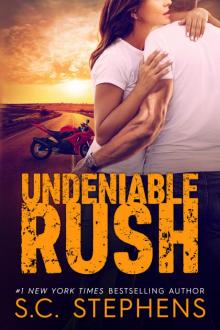 Undeniable Rush
Undeniable Rush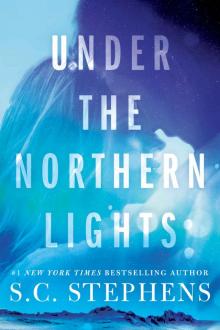 Under the Northern Lights
Under the Northern Lights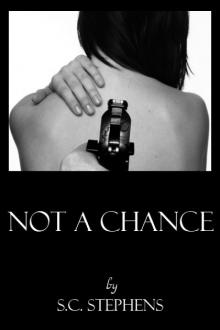 Second Rate Chances
Second Rate Chances The Next Generation
The Next Generation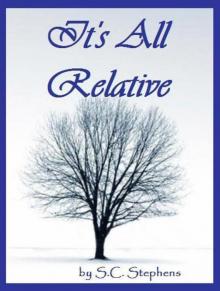 It's All Relative
It's All Relative Not a Chance
Not a Chance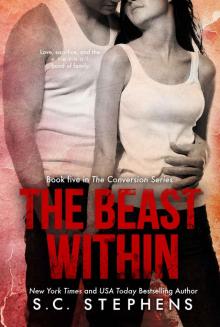 The Beast Within (Conversion Book 5)
The Beast Within (Conversion Book 5)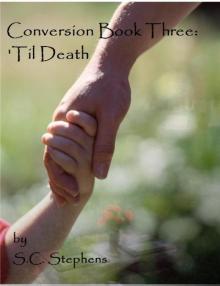 Conversion Book Three: 'Til Death
Conversion Book Three: 'Til Death The Next Generation (Conversion Book 4)
The Next Generation (Conversion Book 4)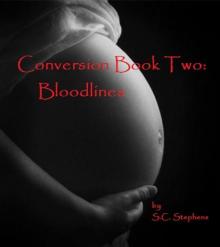 Conversion Book Two: Bloodlines
Conversion Book Two: Bloodlines